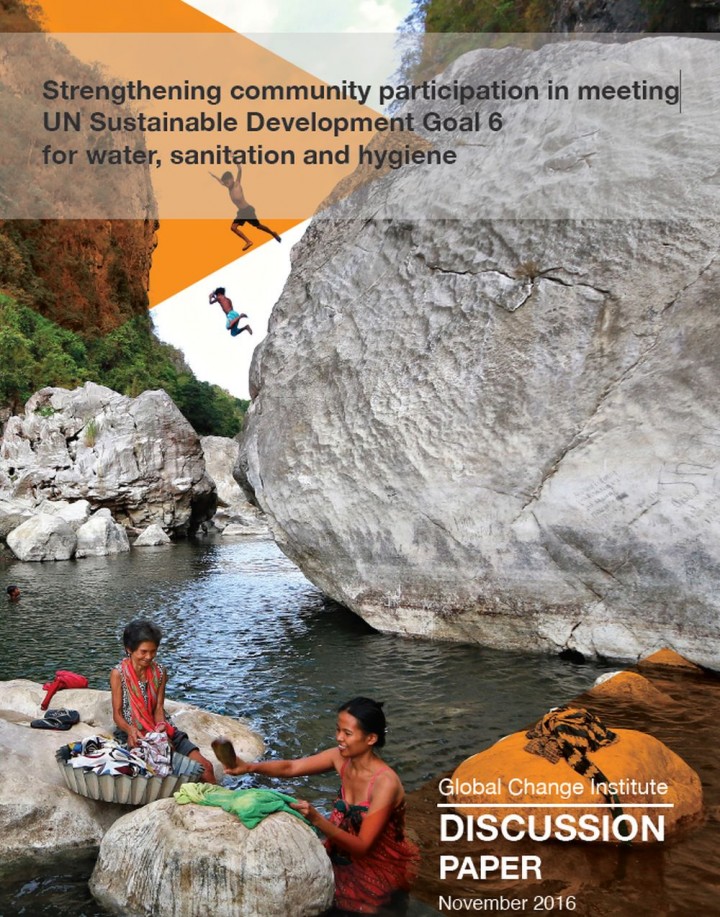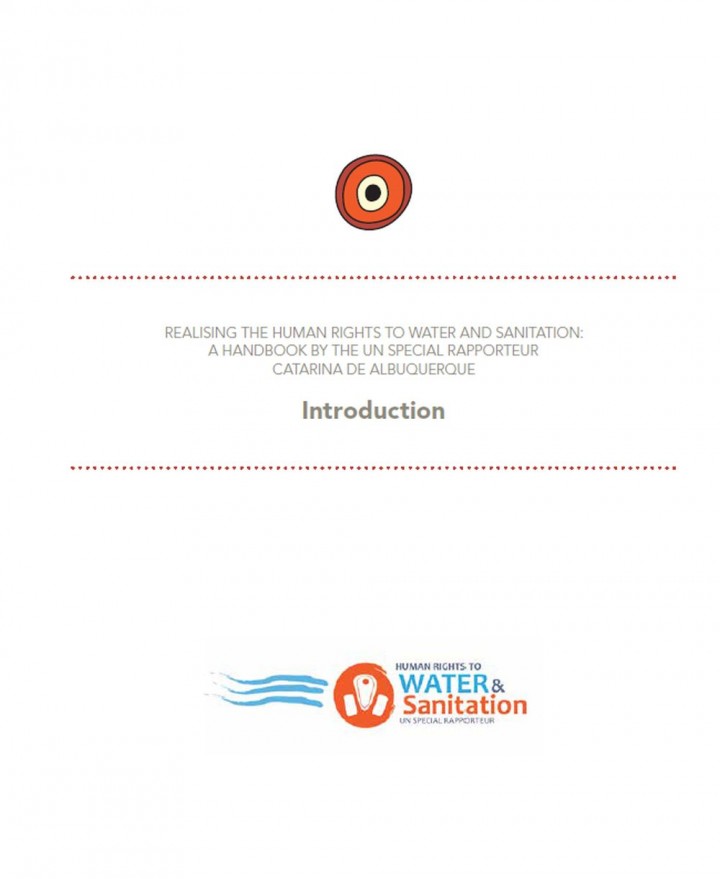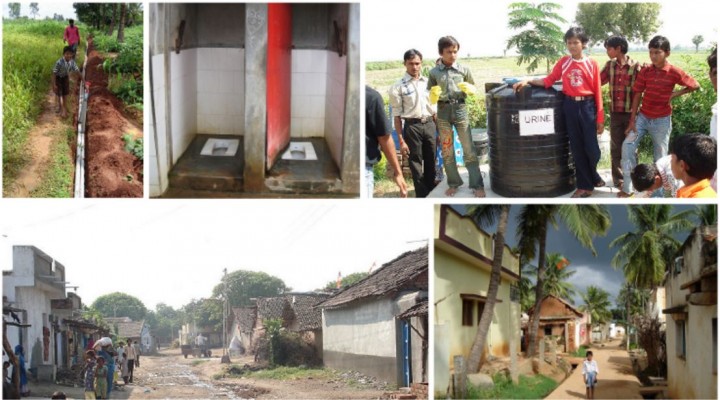Hall, N. et al. (2016) Strengthening community participation in meeting UN Sustainable Development Goal 6 for water, sanitation and hygiene Discussion Paper No.3
Countries have much work to do to achieve the UN Sustainable Development Goals by 2030. But development projects don’t always go the way you expect. A resettlement project in Laos recently provided taps and toilets as a way to improve hygiene and health outcomes for communities. But on revisiting the resettled village, the project team was dismayed to find that the new brick toilet facilities […]
Hall, N. et al. (2016) Achieving the UN Sustainable Developement Goals for water and beyond Discussion Paper No.2
This transdisciplinary discussion paper, from 13 researchers across seven schools at The University of Queensland, considers Australia’s efforts to achieve the United Nations Sustainable Development Goals in Australia and within the broader Asia-Pacific region. It focuses particularly on those SDGs that are concerned with water, and it challenges the current steps being undertaken towards attaining the SDGs in both Australia and overseas. The recommendations identify […]
Hall, N. et al. (2016) The UN Sustainable Development Goals for water and sanitation - How should Australia respond within and beyond its borders? Discussion Paper No.1
Australia is positioned next to south-east Asia, where one billion people lack access to adequate sanitation facilities. Only half the population in the Pacific Island countries have access to such facilities, while poor hygiene and unsanitary living conditions have contributed to children in remote Australian Aboriginal communities experiencing a higher rate of common infectious diseases than in large urban communities. In 2015, the UN updated […]
Stockholm International Water Institute (2016) City-wide sanitation: The role of planning Policy brief
In 2016 the World Water Week (WWW) brought together leading experts from around the world to discuss and share the latest experiences on planning urban sanitation in two sessions convened by WaterAid, UNDP-SIWI Water Governance Facility, GIZ, SuSanA, and the World Bank. This policy brief synthesises the key lessons and recommendations that grew out of that encounter, calling for more flexible and context-sensitive planning and […]
De Albuquerque, C. (2014) Realising the human rights to water and sanitation: A handbook Arabic, French, Portuguese and Spanish
A product of six years of work, the goal of the handbook is to explain the meaning and legal obligations of these rights and to translate complex technical and legal language into accessible information. Designed for a broad audiences in the Global South and North, the information should be useful to civil society sanitation advocates, human right organizations, national and local offcials, service providers, and […]
SuSanA (2016) SuSanA - Thematic Discussion Series synthesis template
This is the template for SuSanA Thematic Discussion Series syntheses in a Word format. Please use this format if you wish to prepare a new SuSanA synthesis. If you have any questions please E-Mail the secretariat: info@susana.org
Monse, B. et al. (2016) Localized school-based feeding concept in the autonomous region of Muslim
Making schools healthy environments requires a holistic approach that should combine various interventions to ensure that children are fit for school. However, these interventions must be simple, scalable, sustainable, and integrated into existing systems to ensure that they can be feasibly implemented by school communities with limited resources. Increasing its usefulness could only be possible if they could easily blend with accepted practices and ensuing […]
Toilet Board Coalition Secretariat (2016) The digitalisation of sanitation Transformation to smart, scalable and aspirational sanitation for all
In 2016 the Toilet Board Coalition ran a Feasibility Study to explore the potential role of mobile and digital applications to drive efficiencies and consumer demand in sanitation business models operating in low income markets. The following questions were at the centre of our inquiry: • How are sanitation businesses operating in low-income markets using mobile and digital applications in their businesses today? • How are sanitation […]
GTO (2016) WASH ePaper Issue No.6 (in English, French and Spanish)
The WASH ePaper is an online magazine published at regular intervals in German, English, French and Spanish. Each issue takes a closer look at a current key issue in the water, sanitation and hygiene (WASH) sector and related areas. It also provides updates on forthcoming national and international events, highlights current publications and projects, and reports on news from the sector. The WASH e-paper is […]
Fernández-Martínes, L. (2016) Using the Shit/Excreta Flow Diagrams (SFDs) for modelling future scenarios in Kumasi, Ghana A research project submitted in partial fulfilment of the requirements for the award of the degree of Master of Science of Loughborough University
The high population density of the cities does not allow families to safely abandon onsite sanitation facilities. This creates a need for a sanitation service chain to safely manage feacal waste. Hence, Shit/Excreta Flow Diagrams (SFD) are being developed as an analysis tool, which illustrates excreta pathways along the sanitation service chain in a city. The main objective of this study is to use the […]
Hague, J. (2016) Sanitation in the circular economy Transformation to a commercially valuable, self-sustaining, biological system
In 2016 the Toilet Board Coalition ran a feasibility study to explore the potential role of sanitation in the circular economy. The following questions were at the centre of our inquiry: • Are there products or materials of value being upcycled from toilet resources? • Are there scalable business models to deliver sustainable supply of these products to the market? • Is there commercial interest and demand from […]
Hynes, P. (2016) Thematic Discussion: Integrating sectors to address the holistic needs of children Thematic Discussion Series Synthesis
The new era of the Sustainable Development Goals (SDGs) has enhanced the conversation around the need for partnerships (SDG 17) and has accelerated a conversation about how organisations should best work together. The success of each SDG is linked to the progress of all the other Goals, especially when we consider the most vulnerable, such as children in their first 1,000 days of life. A […]
Mason, N., Matoso, M., Hueso, A., (2016) Beyond political commitment to sanitation Navigating incentives for prioritisation and course correction in Ethiopia, India and Indonesia
A growing number of countries are showing commitment on sanitation at the highest levels of government. However, to turn this commitment into action, it is necessary to permeate the prioritisation of sanitation throughout the government machinery and to ensure course correction, adapting policy to the blockages and emerging implementation challenges. This research explores these processes in three countries – Ethiopia, India, and Indonesia – paying […]
Danaei, G. et al. (2016) Risk factors for childhood stunting in 137 developing countries: A comparative risk assessment analysis at global, regional and country level
Stunting affects one-third of children under 5 years old in developing countries, and 14% of childhood deaths are attributable to it. A large number of risk factors for stunting have been identified in epidemiological studies. However, the relative contribution of these risk factors to stunting has not been examined across countries. We estimated the number of stunting cases among children aged 24 - 35 mo […]
Jacob, N. (2016) On the way to "clean India": 2 years of Swacch Bharat Mission (Urban) Thematic Discussion Series Synthesis Document
With the implementation of the SuSanA Indian Chapter, disucssions around Sanitation in India are held in a regular period on the SuSanA Forum. In India, Swachh Bharat Mission has been launched 2nd October 2014 to eradicate open defecation and implement behaviour change across India´s society. The following is a synthesis of the posts published during the discussion about the challenges and success of SBM urban. […]
Jacob, N., von Falkenhausen, A., Bauer, M. (2016) On the way to "clean India": 2 years of Swacch Bharat Mission (Gramin) (Rural) Thematic Discussion Series Synthesis Document
With the implementation of the SuSanA Indian Chapter, this TDS was the first with focus on sanitation in India. Since it was launched 2nd October, 2014, Swacch Bharat Mission (SBM) has been one of the Indian government’s flagship programmes to eradicate open defecation and implement behaviour change across India´s society. The first thematic online discussion of the India Sanitation Coalition (ISC) which is hosted by […]
Dauenhauer, K., Schlenk, J., Langkau, T. (2016) Managing WASH in Schools: Is the Education Sector Ready? A Thematic Discussion Series hosted by GIZ and SuSanA
The direct links of WinS to SDG3 (health), SDG4 (education) and SDG6 (water and sanitation) pose the chance for increased inter-sectoral cooperation. Thereby, the education sector’s leadership and management are critical to broad-scale implementation and success of WinS. Yet, how is the education sector taking WASH on board and how can the sector manage it? How does the reality look like in schools around the […]
John Rogers, W. et. al. (2016) Water and sanitation interlinkages across the 2030 Agenda for sustainable development
This UN-Water Analytical Brief analyses the central role of water and sanitation to describe the links and interdependencies between the targets of Sustainable Development Goal 6 on water and sanitation and those of other SDGs. It aims to stimulate United Nations Member States’ consideration of the water-related linkages within the SDGs to facilitate an integrated approach to implementation.
Hutton, G., Varughese, M. (2016) The costs of meeting the 2030 Sustainable Development Goal targets on drinking water, sanitation and hygiene
This study provides an assessment of the global costs of meeting the WASH-related targets of SDG 6. The targets assessed include achieving universal and equitable access to safe and affordable drinking water for all (target 6.1), achieving access to adequate and equitable sanitation and hygiene for all, and ending open defecation (target 6.2). The estimates include 140 countries, or 85% of the world's population, focusing […]
UN (2016) The Sustainable Development Goals Report 2016 (in English, French and Spanish)
The aim of this report is to present an overview of the 17 SDGs using data available in 2016 to highlight the most significant gaps and challenges. This baseline report is meant to be a starting point for the implementation of the SDGs and its monitoring.




















